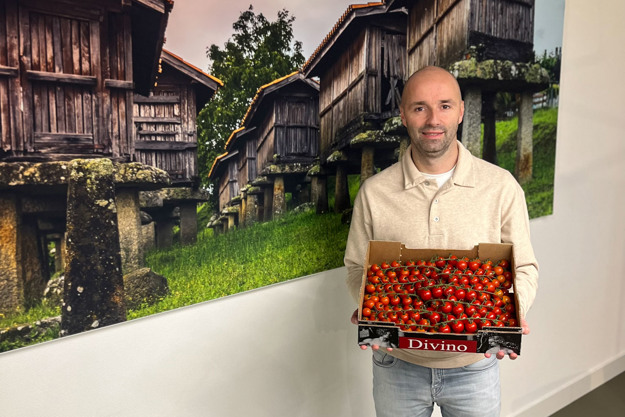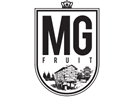With the 'eternally young' Miguel Gonzalez at MG Fruit's helm, Spain is a key country for this Dutch company. He thought about quitting in 2013, but the fruit and vegetable world remains dear to him, and it was not the right time to throw in the towel. Miguel built a team around him specializing in importing fruits and vegetables from Spain and Latin America. He and import manager Luis Ramos look ahead to the Spanish vegetable season.

"The Spanish fruit-vegetable season is, aside from bell peppers, off to a good start," Luis says in early November. "The market had somewhat fewer Dutch eggplants and zucchini until late October. But there are far fewer now. Because of that, sales are going considerably better, and prices are higher. The weather in Spain is cooperating well, too. The quality is good, and there's enough production available, so prices aren't shooting up. That's happening with the cucumbers, though. Due to the Dutch product disappearing off the market, prices are sky-high."
There is a fruit-vegetable that is lagging regarding prices: Dutch bell peppers. "Until October, there were still plenty of those on the market. That supply decreased slightly but was expected from the Netherlands until week 46. The Spanish bell peppers are in reasonable production, and there are enough to supply the supermarkets. That's causing some price pressure," says Luis.
He says there are no major Spanish fruit-vegetable acreage shifts. "But people are never completely transparent about that. However, there are rumors that fewer cherry tomatoes and slightly more bell peppers have been planted. Most of the acreage used for TOVs last year has gone to bell peppers."
Virus pressure
The Tomato brown rugose fruit virus (ToBRFV) pressures remain an issue, especially in the tomato market. "That has little impact now, but given the last few years' experience, that will become more obvious as the fruit comes off the plant. Spanish tomatoes usually have the hardest time in September when the summer heat leads to relatively low production. But, it's already November, and cherry and cherry plum tomato prices, for example, are still quite high, also as a result of the Dutch crop ending early," explains Luis.
Morocco is Spanish growers' main competition. "I don't expect that country to become an even bigger competitor than it already is for Spain. Pricing-wise, Morocco is often more favorable than Spain because of cheaper labor. However, because of the high costs, people there are noticeably creeping more toward Spanish prices. Morocco isn't automatically cheaper anymore and has a clear position next to Spain. Overseas investors have recently invested a lot in Morocco. Spain thus received a wake-up call, and many companies have professionalized. Morocco's water shortage, though, is even more urgent than Spain’s."
Plastic or vegetable waste?
The organic vegetable share in Spain is on the rise, but MG Fruit does not specialize in that category. "Some of our suppliers also have organic vegetables; we, however, do little or none of that. We have no demand for that from our customers. You pay extra for it, and people aren't willing to do that in tougher economic times. Similarly, sealed cucumbers are back to square one. There was slightly more waste when they were unpackaged. Then you have to choose what's better for the environment: plastic or vegetable waste? Ultimately, each client has to decide for themself," Luis reckons.
From commission trading to fixed deals
"In recent years, the mood has shifted. Costs must at least be covered; otherwise, people won't deliver. That also fits in with the market transition from commission trading to more fixed agreements. Everything is much more planned, and far more is sold in advance. It's no longer 'long live the free market'. I think that's a good thing. You now know your selling price in advance, and less produce floods the market."
According to Luis, transport from Spain to the Netherlands is significantly challenging. "Groupage transport is definitely becoming extremely difficult. Many companies buy directly from Spain. That puts transporters under immense pressure and causes plenty of headaches. The time pressure asked of them is often quite unreasonable. Customers expect an exact arrival time," he says.
"Especially now that exports to, say, the United Kingdom require more documentation time. That's doable with full trucks, but with groupage, it's very tricky to give an exact ETA. The drivers must do 2,000 kilometers. If they average 80km/hr, that's already 25 hours of pure driving, never mind all the possible glitches."
Butternut squash has growth potential
A product that has gained significant market share recently is butternut squash. Luis: "Spain slightly expanded that product's acreage this year, but the drought meant lower yields, and less is coming off the land. We feed Spanish pumpkins year-round, with June and July being the toughest months, availability-wise."
Climate change is making growing things like Dragon fruit and finger limes hard. "These are still relatively small volumes, but some customers are very keen on them. Here, it remains a search for the right supplier/ buyer combination," concludes Luis.
Luis Ramos MG Fruit
MG Fruit
Handelscentrum ZHZ 49-60
2991 LD Barendrecht
+31 (0)6 5126 7933
[email protected]
www.mgfruit.nl
